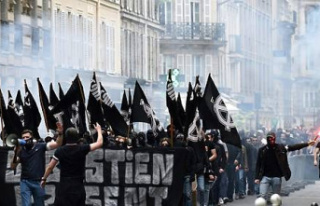S. Mamang Vaiphei, a father of five, hid in the jungle for three nights, fleeing a mob attacking his village in northeast India, during an outbreak of inter-ethnic violence that has kills at least 54.
"Everything was on fire... We ran away, we all ran into the jungle and tried to survive," he recalls.
"The Meiteis first burned 26 or 27 houses," the 54-year-old told AFP, who found refuge inside an army camp with around 900 other people.
“Then they came back and finished destroying the 92 houses in the village, ransacking the church, the school and all that was left,” he continues.
Around him, men, women and children, exhausted and traumatized, recount similar scenes.
India's northeastern states, wedged between Bangladesh, China and Burma, have long been hotbeds of inter-ethnic tension and separatism.
The outbreak of violence in the state of Manipur was sparked by a protest last week against the possible awarding of "scheduled tribe" status to the Meiteis, the majority ethnic group in the state.
This statute, establishing a kind of positive discrimination, would guarantee them quotas of public jobs and admissions to universities.
The predominantly Hindu Meiteis live in and around Imphal, the capital of Manipur, while the predominantly Christian and minority Kuki tribe live in the hills.
Violence erupted between Meiteis and Kukis in Imphal where, according to residents, vehicles and buildings were set on fire, and bands of Meiteis armed with guns and petrol cans went to attack Kuki villages in the hills.
The army deployed thousands of soldiers, ordering them to "shoot on sight" in "extreme cases", imposed curfews and cut off the internet.
Mr. Mamang, who spent his fifth night homeless on Sunday, is one of some 23,000 people the army claims to have brought to safety.
He says that on May 4, he fled his village of Kamuching, which had more than 500 inhabitants, when "a large crowd" launched an assault.
Most of the villagers managed to pack a few things thrown in a bag, a change of clothes and their smartphone.
"All of us here are nervous, we are afraid of death," Alun Vaiphei, 50, a Kuki villager from Gotangkot, also a refugee in the army camp, told AFP.
"To save our lives, we called the riflemen from Assam (a neighboring state, editor's note) to come and help us in our hiding place," he continues.
On Sunday, life seemed to have come to a standstill in and around Imphal, where businesses were closed and the roads deserted, still littered with burnt-out cars.
The violence has subsided, but Army Brigadier Sandeep Kapoor said on Sunday he still received "50 to 60 calls" for help.
Its teams rescued around 2,000 people, Kukis and Meitis, in 48 hours, a mission made difficult by the total absence of dialogue between the two communities.
"We cannot move them in broad daylight because there is always the risk that members of one or the other community will see us passing through the villages and become aggressive," another officer told AFP.
A few men, small children, elderly women and young girls were huddled inside three military trucks. Among them, Leh Haokip, 35, from Gotangkot village, recounts how his house was looted and his cattle stolen.
"We received no help from the police or the state," he said, distraught. "Now we don't know what to do or where to go."
08/05/2023 15:20:19 Andro (Inde) (AFP) © 2023 AFP












